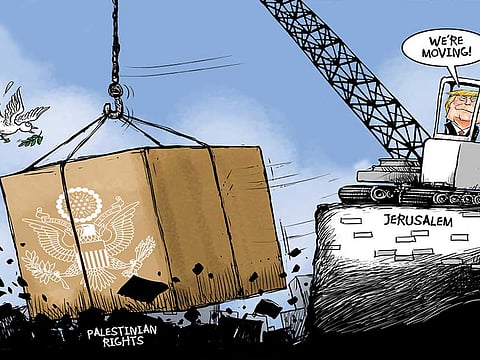Jerusalem decision is debacle of the century
Trump’s reckless decision marks a sad day for Palestine and all those who care for peace in Middle East

Every time it seems United States President Donald Trump cannot outdo himself, he does it again. Now he has announced that his administration will recognise occupied Jerusalem as Israel’s capital, reversing nearly seven decades of American policy. This step will have multiple negative ramifications, many impossible to predict.
Occupied Jerusalem is the most important of the so-called final status issues that have been repeatedly deferred during the Israel-Palestine negotiations because of their extreme sensitivity. Trump has ploughed into this imbroglio like a bull in a china shop, zeroing in on the most complex and emotional issue of all those connected to Palestine.
Occupied Jerusalem is undoubtedly the most important aspect of the entire Palestine question. It has been central to the identity of Palestinian Muslims and Christians as far back as the founding moments of both religions, and has become even more so as the conflict over Palestine has become fiercer.
The rivalry over this holy city is exacerbated by the fact that the same site — Al Haram Al Sharif to Muslims, the Temple Mount to Jews — is sacred to both. Because of its explosive nature, this is an issue that no Palestinian politician, and few Arab leaders, would dare trifle with. For someone such as me, whose family has lived in occupied Jerusalem for hundreds of years, Trump’s announcement doesn’t just mean that the US has adopted the Israeli position — that occupied Jerusalem belongs exclusively to Israel. He has also retroactively legitimised Israel’s seizure and military occupation of Arab East Jerusalem during the 1967 war, and its imposition of discriminatory laws on hundreds of thousands of Palestinians living there. The damage he has done will be permanent: The US cannot undo this recognition.
This act completely disqualifies the US from its long-standing role as broker, a position that Washington has monopolised for itself. So much for the pitiful “peace plan” that Trump’s son-in-law Jared Kushner was cooking up and hoping to impose on the Palestinians.
Arab people are unanimous
Trump’s action signals disdain for the opinion of the whole Arab world. Arab people are unanimous in supporting the Palestinian position on occupied Jerusalem. Their inevitable reactions to this move will impinge on vital US interests all over the region. As US Secretary of Defence James Mattis noted in 2013: “I paid a military security price every day as a commander of [Central Command] because the Americans were seen as biased in support of Israel.”
This latest diplomatic fiasco is another instance of the US administration showing utter contempt for the views of the rest of the world. Not one country recognises occupied Jerusalem as Israel’s capital. There is a global consensus that until a settlement is achieved, it is illegitimate to prejudge or predetermine the outcome of negotiations. The US formally assured the Palestinians on this score in inviting them to the 1991 Madrid peace conference.
Of course, there is a lengthy American track record of bias in favour of Israel. No one should have expected fairness on this issue from them or from their boss.
It is now hard to see how a sustainable Palestinian-Israeli agreement is possible. True to Trump form, this is an entirely self-inflicted wound that will long echo in the annals of diplomacy. It will further diminish the already reduced standing of the US, complicating relations with allies, with Muslims and Arabs — and with people of common sense the world over.
Trump, who was warned against this step by Arab, Middle Eastern and European leaders, has now made resolving the conflict over Palestine much harder, even as he has brought joy to his friends, and to their dangerous, extremist soul mates in Israel.
Far from ushering in the “deal of the century”, as he had boasted, with this move, Trump may have ushered in the debacle of the century. This is a sad day for international law, for Palestine, and for everyone who cares about peace in the Middle East.
— Guardian News & Media Ltd
Rashid Khalidi is a noted political scientist and the Edward Said professor of Arab studies at the Columbia University.
Sign up for the Daily Briefing
Get the latest news and updates straight to your inbox



